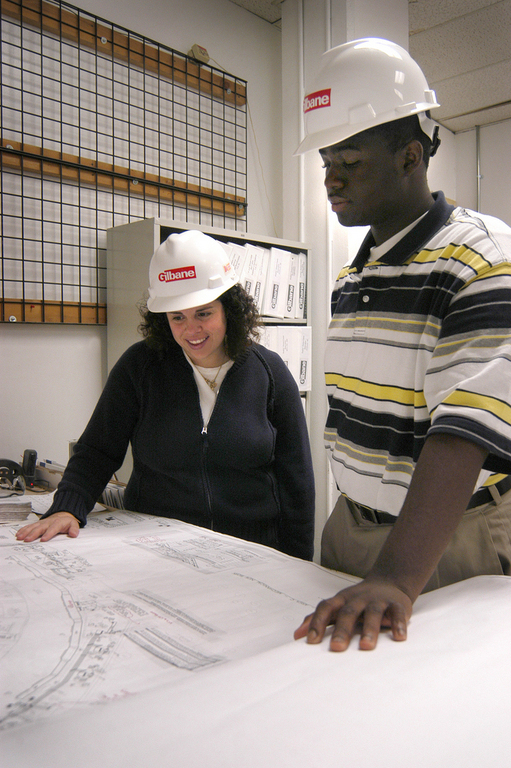
Elsch Maisoh had every intention of pursuing a business degree when he graduated from the Met Center last spring, going so far as to enroll at Johnson & Wales University.
But by the start of the school year in September, he was attending the Community College of Rhode Island and working fulltime at Gilbane Inc. in Providence. His ultimate goal: to become a construction project manager.
“I don’t regret my decision at all,” the 18-year-old said last week. That’s because Maisoh is taking advantage of a new work-study program involving CCRI, Roger Williams University, the Met Center and Gilbane – a program that will provide selected students a well-paying job while they work toward a degree in construction management.
When they graduate, “they’ll really have the world by the tail,” said Robert Potter, dean of engineering, computing and construction management at Roger Williams. “It’s a wonderful opportunity.”
The work-study program – one of the first of its kind in Rhode Island – is in response to the shortage of construction project managers, people with abilities ranging from estimating jobs to hiring engineers and contractors to ensuring the job is completed on time.
At the same time, the involvement of the Met Center, a Providence-based, state-financed high school, encourages the recruitment of students from socially and economically disadvantaged backgrounds – “fertile ground” in the search for future managers, according to Paul Choquette Jr., chairman of Gilbane.
The program works this way: While at the Met Center, interested students will be steered into a math and science curriculum and will serve as interns at Gilbane.
After graduation, two students each year will be awarded full-time engineering clerk positions at Gilbane while working toward an associate’s degree at CCRI.
When they’re done, they will be admitted to the Roger Williams’ School of Engineering, switching to part-time hours at Gilbane. Under the agreement, Roger Williams will provide a scholarship covering 25 percent of the annual $25,000 tuition; Gilbane will cover another 25 percent.
When the students graduate in two years with a degree in construction management, a job will be waiting for them at Gilbane.
“There’s no requirement that they work for Gilbane when they graduate,” Choquette said. “They’ll be able to make their own decision on where they go. And it’s up to us to convince them to stay.”
The first students to take advantage of the program – Maisoh and Dan Rivera – have already been assigned jobs at Gilbane. Rivera is working at a construction site at T.F. Green Airport in Warwick; Maisoh has been initially assigned to the business development office because until last week, he was only 17 and couldn’t work on a construction site.
It is a good time to be a construction manager.
According to a July 2005 salary survey by the National Association of Colleges and Employers, candidates with a bachelor’s degree in construction science/management received job offers averaging $42,923 a year. The median annual salary of construction managers in May 2004 was $69,870.
Roger Williams is the only school in Rhode Island that offers a construction management program. Students study math, science and engineering and learn the ins and outs of estimating and scheduling projects, according to Potter. They also minor in business.
The 30 or so annual construction management graduates are heavily recruited by building companies. “That sector of the economy is robust,” Potter said. “And the competition for competent people to manage projects is intense.”
Potter said the idea for the work-study program took shape during a meeting he had with representatives from the Met Center and Gilbane earlier this year.
As the program matures, Choquette and Potter said, they would like to share the results with other companies and industries in hopes that others will try something similar.
“In my opinion, this is the best type of thing that companies and institutions such as ours can do,” Potter said. “And there’s a great deal of room for increasing this type of activity at Roger Williams.”
Back at Gilbane headquarters, Maisoh acknowledged last week that he chose to enter the work-study program largely for the financial aid. But he also researched the construction field and Gilbane and liked what he found.
Is he concerned that he won’t have the desire to stick with it in the long run?
“I’m the type of person that once I start something I finish it,” he said. “And not many people can say they started their career when they were 17.” •











